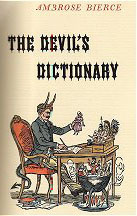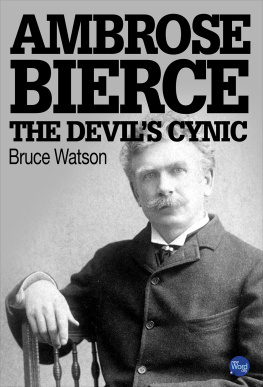Ambrose Bierce - The Collected Works of Ambrose Bierce, Volume 1
Here you can read online Ambrose Bierce - The Collected Works of Ambrose Bierce, Volume 1 full text of the book (entire story) in english for free. Download pdf and epub, get meaning, cover and reviews about this ebook. genre: Prose. Description of the work, (preface) as well as reviews are available. Best literature library LitArk.com created for fans of good reading and offers a wide selection of genres:
Romance novel
Science fiction
Adventure
Detective
Science
History
Home and family
Prose
Art
Politics
Computer
Non-fiction
Religion
Business
Children
Humor
Choose a favorite category and find really read worthwhile books. Enjoy immersion in the world of imagination, feel the emotions of the characters or learn something new for yourself, make an fascinating discovery.

- Book:The Collected Works of Ambrose Bierce, Volume 1
- Author:
- Genre:
- Rating:3 / 5
- Favourites:Add to favourites
- Your mark:
- 60
- 1
- 2
- 3
- 4
- 5
The Collected Works of Ambrose Bierce, Volume 1: summary, description and annotation
We offer to read an annotation, description, summary or preface (depends on what the author of the book "The Collected Works of Ambrose Bierce, Volume 1" wrote himself). If you haven't found the necessary information about the book — write in the comments, we will try to find it.
The Collected Works of Ambrose Bierce, Volume 1 — read online for free the complete book (whole text) full work
Below is the text of the book, divided by pages. System saving the place of the last page read, allows you to conveniently read the book "The Collected Works of Ambrose Bierce, Volume 1" online for free, without having to search again every time where you left off. Put a bookmark, and you can go to the page where you finished reading at any time.
Font size:
Interval:
Bookmark:
The Collected Works of
Ambrose Bierce
Volume 1
Ashes of the Beacon
Of the many causes that conspired to bring about the lamentable failure of self-government in ancient America the most general and comprehensive was, of course, the impracticable nature of the system itself. In the light of modern culture, and instructed by history, we readily discern the folly of those crude ideas upon which the ancient Americans based what they knew as republican institutions, and maintained, as long as maintenance was possible, with something of a religious fervor, even when the results were visibly disastrous. To us of to-day it is clear that the word self-government involves a contradiction, for government means control by something other than the thing to be controlled. When the thing governed is the same as the thing governing there is no government, though for a time there may be, as in the case under consideration there was, a considerable degree of forbearance, giving a misleading appearance of public order. This, however, soon must, as in fact it soon did, pass away with the delusion that gave it birth. The habit of obedience to written law, inculcated by generations of respect for actual government able to enforce its authority, will persist for a long time, with an ever lessening power upon the imagination of the people; but there comes a time when the tradition is forgotten and the delusion exhausted. When men perceive that nothing is restraining them but their consent to be restrained, then at last there is nothing to obstruct the free play of that selfishness which is the dominant characteristic and fundamental motive of human nature and human action respectively. Politics, which may have had something of the character of a contest of principles, becomes a struggle of interests, and its methods are frankly serviceable to personal and class advantage. Patriotism and respect for law pass like a tale that is told. Anarchy, no longer disguised as government by consent, reveals his hidden hand, and in the words of our greatest living poet,
lets the curtain fall,
And universal darkness buries all!
The ancient Americans were a composite people; their blood was a blend of all the strains known in their time. Their government, while they had one, being merely a loose and mutable expression of the desires and caprices of the majoritythat is to say, of the ignorant, restless and recklessgave the freest rein and play to all the primal instincts and elemental passions of the race. In so far and for so long as it had any restraining force, it was only the restraint of the present over the power of the pastthat of a new habit over an old and insistent tendency ever seeking expression in large liberties and indulgences impatient of control. In the history of that unhappy people, therefore, we see unveiled the workings of the human will in its most lawless state, without fear of authority or care of consequence. Nothing could be more instructive.
Of the American form of government, although itself the greatest of evils afflicting the victims of those that it entailed, but little needs to be said here; it has perished from the earth, a system discredited by an unbroken record of failure in all parts of the world, from the earliest historic times to its final extinction. Of living students of political history not one professes to see in it anything but a mischievous creation of theorists and visionariespersons whom our gracious sovereign has deigned to brand for the worlds contempt as dupes of hope purveying to sons of greed. The political philosopher of to-day is spared the trouble of pointing out the fallacies of republican government, as the mathematician is spared that of demonstrating the absurdity of the convergence of parallel lines; yet the ancient Americans not only clung to their error with a blind, unquestioning faith, even when groaning under its most insupportable burdens, but seem to have believed it of divine origin. It was thought by them to have been established by the god Washington, whose worship, with that of such dii minores as Gufferson, Jaxon and Lincon (identical probably with the Hebru Abrem) runs like a shining thread through all the warp and woof of the stuff that garmented their moral nakedness. Some stones, very curiously inscribed in many tongues, were found by the explorer Droyhors in the wilderness bordering the river Bhitt (supposed by him to be the ancient Potomac) as lately as the reign of Barukam IV. These stones appear to be fragments of a monument or temple erected to the glory of Washington in his divine character of Founder and Preserver of republican institutions. If this tutelary deity of the ancient Americans really invented representative government they were not the first by many to whom he imparted the malign secret of its inauguration and denied that of its maintenance.
Although many of the causes which finally, in combination, brought about the downfall of the great American republic were in operation from the beginningbeing, as has been said, inherent in the systemit was not until the year 1995 (as the ancients for some reason not now known reckoned time) that the collapse of the vast, formless fabric was complete. In that year the defeat and massacre of the last army of law and order in the lava beds of California extinguished the final fires of enlightened patriotism and quenched in blood the monarchical revival. Thenceforth armed opposition to anarchy was confined to desultory and insignificant warfare waged by small gangs of mercenaries in the service of wealthy individuals and equally feeble bands of prescripts fighting for their lives. In that year, too, the Three Presidents were driven from their capitals, Cincinnati, New Orleans and Duluth, their armies dissolving by desertion and themselves meeting death at the hands of the populace.
The turbulent period between 1920 and 1995, with its incalculable waste of blood and treasure, its dreadful conflicts of armies and more dreadful massacres by passionate mobs, its kaleidoscopic changes of government and incessant effacement and redrawing of boundaries of states, its interminable tale of political assassinations and proscriptionsall the horrors incident to intestinal wars of a naturally lawless racehad so exhausted and dispirited the surviving protagonists of legitimate government that they could make no further head against the inevitable, and were glad indeed and most fortunate to accept life on any terms that they could obtain.
But the purpose of this sketch is not bald narration of historic fact, but examination of antecedent germinal conditions; not to recount calamitous events familiar to students of that faulty civilization, but to trace, as well as the meager record will permit, the genesis and development of the causes that brought them about. Historians in our time have left little undone in the matter of narration of political and military phenomena. In Golpeks Decline and Fall of the American Republics, in Sosebys History of Political Fallacies, in Holoboms Monarchical Renasence, and notably in Gunkuxs immortal work, The Rise, Progress, Failure and Extinction of The Connected States of America the fruits of research have been garnered, a considerable harvest. The events are set forth with such conscientiousness and particularity as to have exhausted the possibilities of narration. It remains only to expound causes and point the awful moral.
To a delinquent observation it may seem needless to point out the inherent defects of a system of government which the logic of events has swept like political rubbish from the face of the earth, but we must not forget that ages before the inception of the American republics and that of France and Ireland this form of government had been discredited by emphatic failures among the most enlightened and powerful nations of antiquity: the Greeks, the Romans, and long before them (as we now know) the Egyptians and the Chinese. To the lesson of these failures the founders of the eighteenth and nineteenth century republics were blind and deaf. Have we then reason to believe that our posterity will be wiser because instructed by a greater number of examples? And is the number of examples which they will have in memory really greater? Already the instances of China, Egypt, Greece and Rome are almost lost in the mists of antiquity; they are known, except by infrequent report, to the archologist only, and but dimly and uncertainly to him. The brief and imperfect record of yesterdays which we call History is like that traveling vine of India which, taking new root as it advances, decays at one end while it grows at the other, and so is constantly perishing and finally lost in all the spaces which it has over-passed.
Font size:
Interval:
Bookmark:
Similar books «The Collected Works of Ambrose Bierce, Volume 1»
Look at similar books to The Collected Works of Ambrose Bierce, Volume 1. We have selected literature similar in name and meaning in the hope of providing readers with more options to find new, interesting, not yet read works.
Discussion, reviews of the book The Collected Works of Ambrose Bierce, Volume 1 and just readers' own opinions. Leave your comments, write what you think about the work, its meaning or the main characters. Specify what exactly you liked and what you didn't like, and why you think so.








